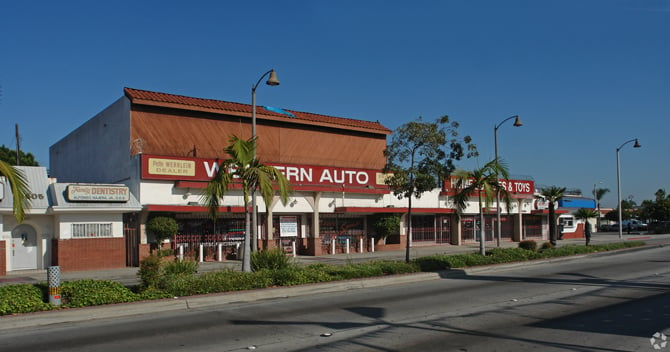
A developer who sees Bell as ripe for reinvention will test the proposition with a project on a property that figured prominently in the city’s dark past.
San Marino-based Arroyo Seco Development Group is underway on the relatively small but symbolically significant project on the site of the long-vacant Western Auto building at 6501 Atlantic Ave. – once the subject of a Los Angeles County District Attorney’s Office probe. Plans call for a retail and restaurant spot the developer hopes will attract workers within its own city limits and from nearby Vernon and Commerce for lunch and dinner.
Arroyo Seco demolished the building on the property in the heart of downtown last month after striking a deal to acquire the 1.6-acre parcel for $2.1 million.
Bell itself is taking part in its makeover. The city agreed to spend $4.6 million on a 2.2-acre property across the street from the Western Auto building. It hopes shops and restaurants eventually sprout there, too.
Bell and Arroyo Seco are capitalizing on one of the city’s bright spots – its restaurant scene. It already has a rising star in the much-praised La Casita Mexicana, which sits further west on Gage Avenue from the redevelopment sites.
It’s a sign that the city is writing a new chapter.
“We’re trying to make our little downtown a retail-and-dining destination,” said Bell Mayor Fidencio Joel Gallardo. “That’s what we’re hoping to develop on both corners, actually.”
Fresh start
Bell officials have long had plans for redeveloping its busiest intersection – where Gage and Atlantic avenues meet, a key point on the streetscape of southeastern Los Angeles County. Traffic volume at the intersection exceeded more than 27,000 vehicles in 2016, the most recent data available. That’s a clear reflection of Bell’s density, with more than 36,000 people in just 2.5 square miles, about three times the rate for downtown Los Angeles.
Arroyo Seco hopes to capitalize on the location with approximately 12,000 square feet of restaurants and retail.
“We have a design in the project for outdoor space for a meeting and gathering place for the city,” said Steve Boss, principal at Arroyo Seco.
An environmental study currently is underway, said Boss, who anticipates the development at 6501 Atlantic Ave. opening to diners and shoppers during the first quarter of 2019, should it be approved. The company has started pre-leasing discussions with a number of tenants, he added, but wouldn’t disclose which ones.
“There’s no shortage of interest on the tenant side,” Boss said.
City officials and those involved with the property’s development say it’s a golden opportunity to create a bright spot within a city synonymous with municipal graft.
“We’ve been through a lot,” Gallardo, the city’s mayor, said. “It will be great to have Bell in the news for something positive like this.”
He hopes the businesses on both sides of the street will be up and running by the end of 2019, but admits he’s on the bullish side.
Bell’s history of government corruption reached an apex in 2013 when former mayor Oscar Hernandez, former city administrator Robert Rizzo and four city council members, were found guilty of corruption charges and given sentences ranging from probation to 12 years’ imprisonment. The officials had given themselves large taxpayer-funded salaries. Rizzo made around $800,000 per year.
The controversy extended to the old Western Auto building now under redevelopment.
The city purchased the property in 2009 for $4.1 million from the family trust of ex-mayor Peter Werrlein Jr., who in 1985 was sentenced to three years in federal prison for holding hidden interests in a poker casino. Critics said the city bought the property for a vastly inflated sum.
Werrlein was voted out of office after a grand jury found that he and other political figures attended sex parties with teenage prostitutes supplied by convicted Hillside Stranglers Angelo Buono Jr., and Kenneth Bianchi, according to news reports. Werrlein continued doing business with the city after serving his prison sentence in the casino matter.
Political scandals aren’t the only things that delayed the site’s development. The Great Recession hurt Bell as did the dissolution of the state’s redevelopment agencies by Gov. Jerry Brown and the Legislature in response to the state’s budget crisis in 2012.
“It was very, very challenging to develop the sites (in the past),” said James Rodriguez, a senior vice president at the commercial real estate brokerage firm Colliers International.
Rodriguez said he and his team at Colliers previously helped breathe new life into Paramount, another Los Angeles suburb that had fallen on hard times. Paramount city officials worked with Colliers to construct a shopping plaza, renovate old businesses and spruce up Paramount Boulevard with trees and wide sidewalks. Applebee’s International Inc., Chipotle Mexican Grill Inc., WaBa Grill Franchise Corp. and the Habit Burger Grill were among the national restaurant chains that signed leases there.
“Home run”
Bell will have to settle mostly for indirect benefits from the new development on the site of the Western Auto Building, which is mostly owned by the successor to the community redevelopment agency as a stakeholder in the property.
“The city’s not going to get the money,” said City Manager Howard Brown, referring to property sale proceeds, “but we’re going to get the improvement, and that’s what we’re happy about.”
Bell also will receive money from the state’s gasoline tax to repave and improve Atlantic Avenue, which bisects the city, running north-south.
Mayor Gallardo said the property’s redevelopment could build something government officials have lacked from constituents – trust.
“It’s going to be a home run for our residents,” he said.
Success will serve as a catalyst for other local cities to create and define their downtown areas, Rodriguez predicts.
“This will set the bar for future development,” he said.
